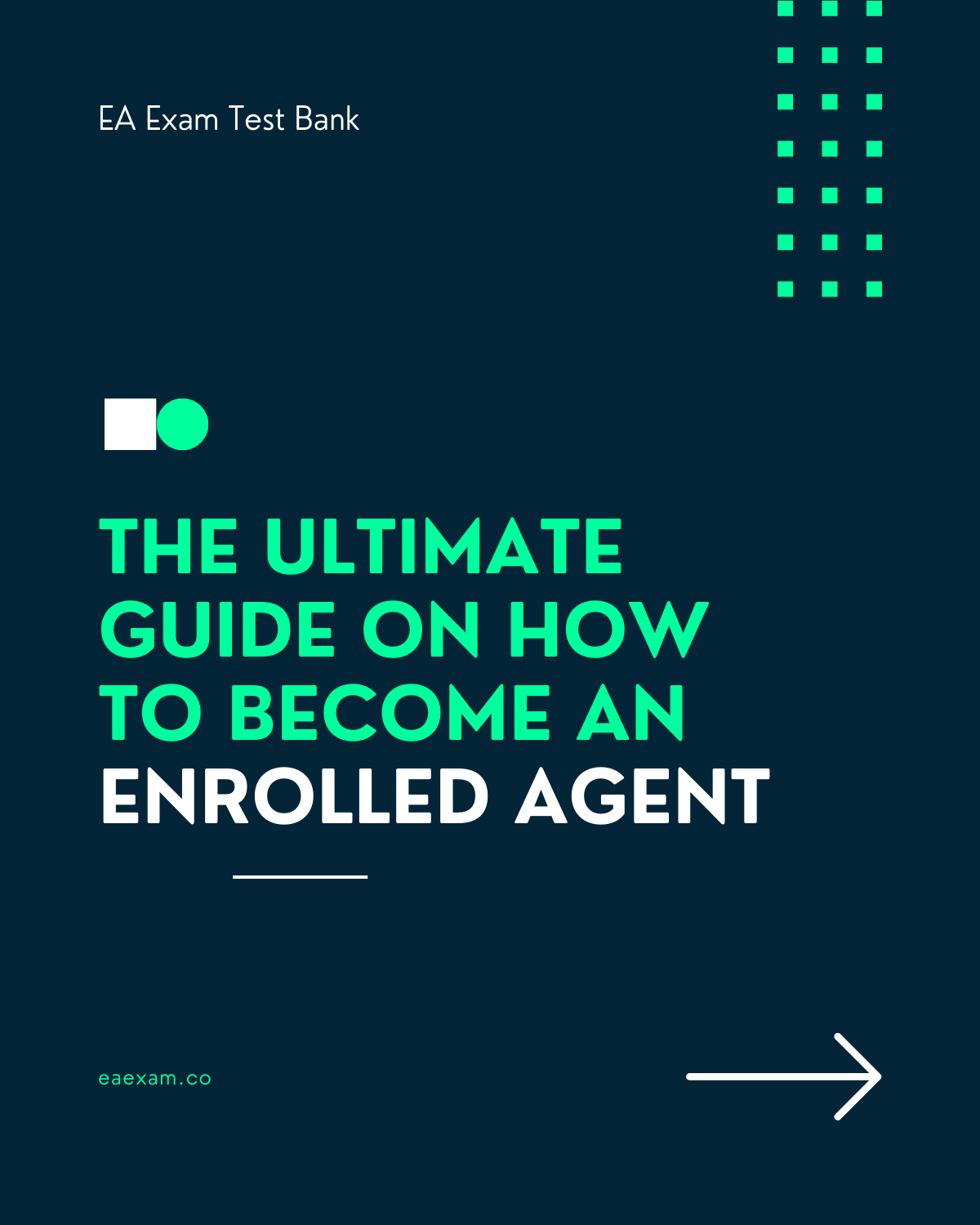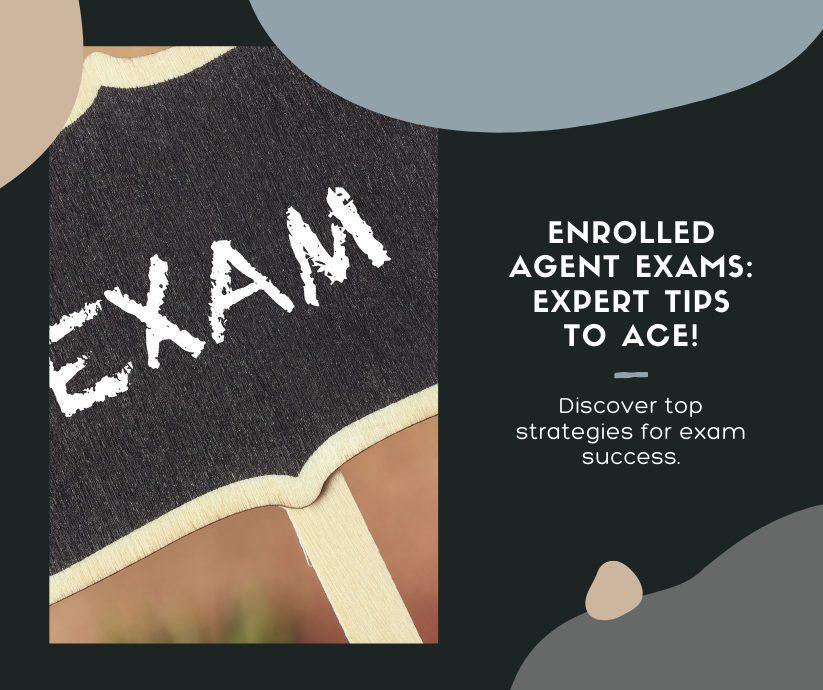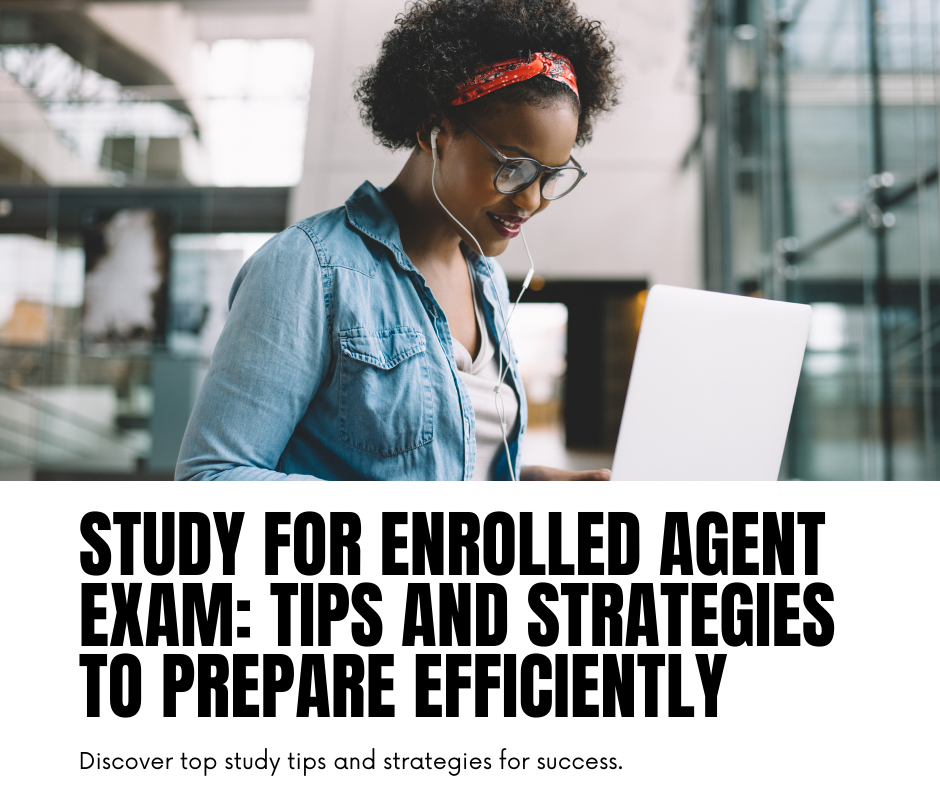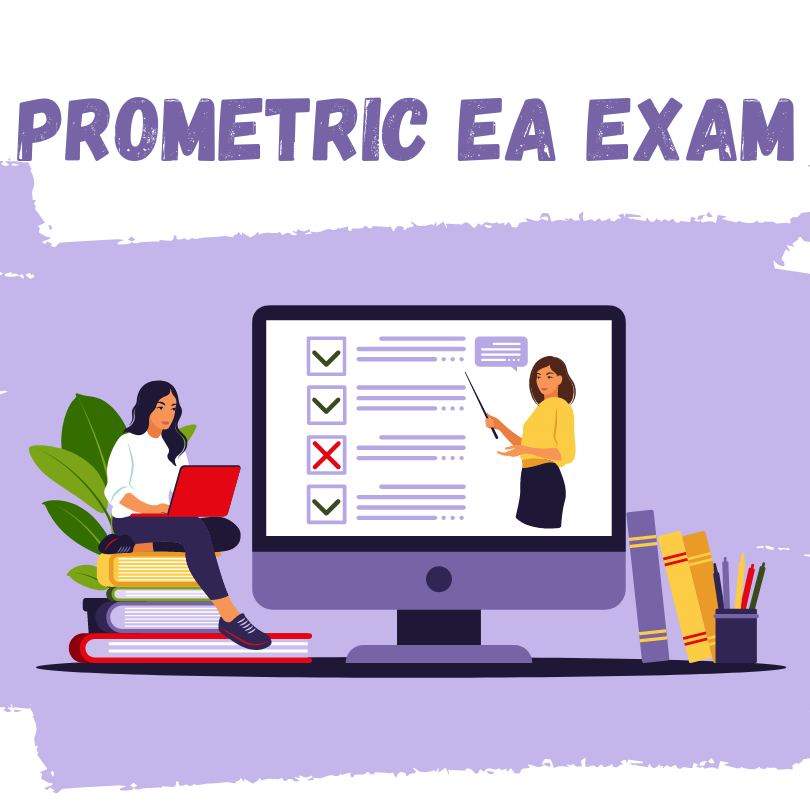Become an Enrolled Agent: Step-by-Step Guide
Passing the Enrolled Agent (EA) exam opens the door to...

Learning how to become an enrolled agent is the first step towards a rewarding career in taxation. Enrolled agents (EAs) play a crucial role as individuals who can represent taxpayers before the Internal Revenue Service (IRS). Unlike certified public accountants (CPAs) and attorneys, EAs hold a federal license that allows them to represent taxpayers in any state regarding federal tax matters. This federal designation gives EAs the authority to negotiate with the IRS during examinations and appeals, sign consents, and execute agreements on behalf of taxpayers. Their expertise and knowledge in tax matters make them valuable assets in helping individuals and businesses navigate the complexities of the IRS.
For example, consider a small business owner who is facing an audit by the IRS. The owner decides to hire an enrolled agent to represent them during the process. The enrolled agent uses their in-depth understanding of tax laws and regulations to guide the business owner and negotiate with the IRS on their behalf. The enrolled agent’s expertise and experience help the business owner achieve a favorable outcome and navigate the audit process smoothly. Discovering how to become an enrolled agent can open doors to numerous professional opportunities.
One of the unique advantages of becoming an enrolled agent is the ability to separate yourself from the crowd. By obtaining the EA designation, you gain more opportunities for representation and can provide valuable services to taxpayers. Additionally, there is a growing need for enrolled agents to assist taxpayers with IRS collection activities, further highlighting the importance of this profession. Furthermore, becoming an enrolled agent offers unlimited earning potential and a recession-proof career, making it an attractive choice for individuals interested in the tax field. The valuable IRS registration that comes with being an enrolled agent adds to the credibility and expertise of these professionals. The journey on how to become an enrolled agent is filled with learning and growth.

How to become an enrolled agent… there are several steps that need to be followed:
Acquire a Preparer Tax Identification Number (PTIN) from the IRS. This identification number is necessary for tax professionals to prepare tax returns and represent clients before the IRS. The steps on how to become an EA are well outlined by the Internal Revenue Service.
For instance, imagine an individual who wants to pursue a career as an enrolled agent. The first step they would take is to obtain a PTIN from the IRS. This unique identification number allows them to legally prepare tax returns and represent taxpayers before the IRS. Many tax professionals aspire to learn how to become an enrolled agent due to its numerous benefits.
Pass the IRS Special Enrollment Examination (SEE) or leverage experience as a former IRS employee. The SEE is a comprehensive exam that tests candidates on various topics related to taxation. The pathway on how to become an enrolled agent requires dedication and a strong understanding of tax laws.
Once the education and experience requirements are met, the individual can proceed to take the SEE. This exam consists of three parts covering a wide range of tax topics, including individuals, businesses, and representation, practices, and procedures. The quest on how to become an enrolled agent IRS certified begins with a desire to excel in the field of taxation.
To register for the SEE, the individual must have a valid PTIN. Obtaining a PTIN is a prerequisite for taking the exam and becoming an enrolled agent.
To increase their chances of success, aspiring enrolled agents can enroll in specialized courses and utilize study guides specifically designed for the SEE. These resources provide in-depth coverage of the exam topics and offer practice questions and simulations to enhance understanding and retention. There are comprehensive guides available for those looking to understand how to become an enrolled agent.
Once prepared, the individual can schedule their exam at a designated testing center. The SEE consists of three parts, and candidates must pass all three to become enrolled agents. Taking the exam at an authorized testing center ensures a standardized and fair evaluation process.
After successfully passing all three parts of the SEE, the individual can apply for enrollment as an enrolled agent. This involves submitting an application to the IRS within one year of passing the exam and undergoing a background check to ensure suitability for the role.
By following these steps, individuals can fulfill the requirements and become enrolled agents, ready to represent taxpayers before the IRS. The roadmap on how to become an enrolled agent is a journey every tax enthusiast should consider.
In terms of how to become an enrolled agent, several education and experience requirements must be fulfilled. These include:
Obtaining a PTIN is a crucial step in becoming an enrolled agent. It requires providing necessary personal and business information, such as name, address, and social security number, along with payment for the issuance fee. The IRS uses the PTIN to track tax preparers and ensure compliance with tax laws.
The SEE is a comprehensive exam that tests candidates’ knowledge and understanding of various tax topics. To prepare for the exam, individuals should focus on mastering the fundamentals of taxation, including tax laws, regulations, and basic tax formulas. This foundation will enable them to answer exam questions accurately and confidently. The guidelines on how to become an enrolled agent are designed to ensure competency and ethics in practice.
Expanding on the education and experience requirements, it’s worth noting that individuals can also qualify for enrollment as an enrolled agent through relevant employment experience with the IRS. Specifically, having five years of experience in a position that regularly involves applying and interpreting tax laws and regulations can serve as an alternative to the SEE requirement. It’s essential to follow the prescribed steps on how to become an enrolled agent for a successful career in taxation.

The Internal Revenue Service Special Enrollment Examination (SEE) is a comprehensive exam that consists of three parts administered by Prometric on behalf of the IRS. Each part covers different topics related to individuals, businesses, representation, practices, and procedures. The exam consists of multiple-choice questions presented in various formats. To prepare for the exam, candidates can utilize tools and resources such as study guides, online test banks, and practice exams. Enrolling in an enrolled agent review course can also enhance exam readiness. Many online platforms offer resources on how to become an enrolled agent, making the learning process accessible.
Let’s delve deeper into the three parts of the SEE to gain a better understanding of the exam:
To maximize their chances of success in the SEE, candidates should utilize study guides, online test banks, and practice exams tailored specifically to each part of the exam. These resources provide comprehensive coverage of the exam topics, offer sample questions, and simulate the exam environment. Additionally, enrolling in an enrolled agent review course can provide structured guidance and expert instruction to enhance exam readiness. The clarity on how to become an enrolled agent is essential for advancing in the tax preparation field.
Expanding on the exam preparation process, it’s worth mentioning that individuals have the flexibility to choose the study resources and methods that best suit their learning style and preferences. Some may prefer self-paced online courses, while others may opt for in-person review classes. The key is to dedicate sufficient time and effort to studying and practicing exam-related content to ensure thorough preparation. The mastery of how to become an enrolled agent comes with both experience and rigorous examination preparation.
Becoming an enrolled agent offers several benefits:
For example, consider a taxpayer who is facing an audit by the IRS. By hiring an enrolled agent, the taxpayer can have peace of mind knowing that their agent has the authority to represent them before the IRS. The enrolled agent can navigate the audit process, negotiate with the IRS on the taxpayer’s behalf, and ensure a fair resolution.
Enrolled agents are recognized as tax experts and trusted advisors. The EA designation adds credibility to their professional profile, allowing them to attract clients who are seeking expert guidance. This increased expertise can translate into higher fees and a more successful tax practice. The pursuit of how to become an enrolled agent is a commendable goal for any aspiring tax professional.
Unlike other tax professionals who may have limited practice rights, enrolled agents can represent taxpayers in any state regarding federal tax matters. This opens up opportunities for enrolled agents to expand their financial practice, serve clients across state lines, and offer a broader range of tax-related services. The ambition to learn how to become an enrolled agent is the beginning of a notable career path.
Enrolled agents enjoy a higher earning potential compared to non-credentialed tax preparers. Their expertise and ability to handle complex tax matters make them valuable assets in the tax industry. Additionally, the EA designation provides job security, as the demand for enrolled agents continues to grow. By becoming an enrolled agent, individuals can deepen their tax preparation skills and gain a competitive edge in the tax profession. Resources on how to become an enrolled agent are abundant, aiding aspiring tax professionals.
Expanding on the benefits of becoming an enrolled agent, it’s worth mentioning that the EA designation is recognized and respected within the tax industry. Many employers, including accounting firms, tax preparation companies, and financial institutions, value the expertise and credibility that enrolled agents bring to their organizations. This opens up a wide range of career opportunities for enrolled agents, including tax consulting, tax planning, and representation services. An intrinsic part of excelling in tax representation is mastering how to become an enrolled agent.

For aspiring enrolled agents, the EA Exam Test Bank is a comprehensive online platform that provides thousands of IRS practice questions and exams. This platform, turbocharged by artificial intelligence (A.I.), offers personalized study plans, custom flashcards, targeted reading materials, and other features to help students pass the enrolled agent exam on their first attempt. The integration of A.I. enhances the learning experience by providing adaptive and tailored study materials. Those inquisitive about how to become an enrolled agent find the journey intellectually stimulating.
Let’s examine some of the features and benefits of the EA Exam Test Bank:
The EA Exam Test Bank leverages artificial intelligence (A.I.) to enhance the learning experience. The A.I. technology adapts to each student’s progress, offering targeted recommendations and insights to optimize their study journey. This personalized approach increases the efficiency and effectiveness of exam preparation. Your aspirations of understanding how to become an enrolled agent can be realized with the right guidance.
To learn more about the EA Exam Test Bank and start your journey towards becoming an enrolled agent, visit their website at https://eaexam.co/passfast. The platform guarantees customer satisfaction and offers a money-back guarantee, demonstrating their confidence in the effectiveness of their resources. By utilizing the comprehensive study materials and tools provided by the EA Exam Test Bank, aspiring enrolled agents can increase their chances of passing the exam on their first attempt. Courses on how to become an enrolled agent provide a structured pathway towards achieving this credential.
To increase your chances of passing the enrolled agent exam on your first attempt, it is important to follow these steps:
When preparing for the enrolled agent exam, it is advisable to tackle one section at a time. By focusing on each section individually, candidates can allocate their time and efforts effectively. Utilizing study guides and test banks specific to each section enhances comprehension and retention of the exam material. Your endeavor to learn how to become an enrolled agent will be a hallmark of your dedication to tax excellence.
Practice exams are essential in gauging preparedness for the enrolled agent exam. By simulating the actual exam experience, candidates become familiar with the format and timing, allowing them to manage their time effectively during the real exam. Practice exams also highlight areas of weakness that require further study and provide an opportunity to refine test-taking strategies. Tax professionals often recount their journey of how to become an enrolled agent as challenging yet rewarding.
Creating a study schedule and dedicating sufficient time to exam preparation is crucial for success. Consistency is key, as regular study sessions help reinforce knowledge and build familiarity with the exam content. By allocating dedicated study time and adhering to a structured schedule, candidates can approach the exam with confidence and thorough preparation. The roadmap on how to become an enrolled agent unfolds a spectrum of career opportunities in tax representation.
Understanding how to become an enrolled agent is synonymous with achieving a pinnacle of professional competence in taxation. To maintain the enrolled agent license, individuals are required to complete a minimum of 16 hours of continuing education per year, including two hours dedicated to ethics. This ongoing education ensures that enrolled agents stay updated with the latest tax laws, regulations, and ethical standards.
Continuing education is an integral part of maintaining the enrolled agent license. It allows enrolled agents to stay current with changes in tax laws, regulations, and industry practices. By dedicating time to ongoing learning, enrolled agents ensure they provide the most accurate and up-to-date guidance to their clients.
Ethical standards also play a crucial role in the practice of enrolled agents. Enrolled agents are bound by a code of conduct that emphasizes integrity, professionalism, and confidentiality. The two hours of ethics education required each year help enrolled agents navigate ethical dilemmas and maintain the highest standards of professional conduct.
The pathway on how to become an enrolled agent is meticulously designed to breed excellence in tax representation. Enrolled agents have a wide range of career opportunities available to them.They can work with individuals and companies in preparing tax returns. The EA certification offers higher earning potential, job security, and the opportunity to deepen tax preparation skills. By becoming an enrolled agent, individuals gain the credibility, expertise, and added value that can attract clients and enhance their professional reputation.
Enrolled agents can pursue various career paths, including:
The EA certification opens doors to diverse career opportunities and allows enrolled agents to develop a specialization in tax matters. The combination of tax knowledge, representation rights, and ethical standards positions enrolled agents as trusted advisors in the tax industry. The quest on how to become an enrolled agent is an invitation to a realm of infinite learning and professional growth.
Becoming an enrolled agent is a rewarding career path for individuals interested in tax and representing taxpayers before the IRS. By following the steps outlined in this article, individuals can embark on their journey to become enrolled agents. Additionally, the EA Exam Test Bank provides a comprehensive platform to help aspiring enrolled agents prepare for the exam. To learn more about the EA Exam Test Bank and start your preparation, visit their website at https://eaexam.co/passfast.

Begin your path towards becoming an enrolled agent and enjoy the benefits of this esteemed designation. As you progress in your journey, remember to stay updated with changes in tax laws, regulations, and ethical standards to maintain your enrolled agent license and provide the best possible service to your clients. Aspiring tax practitioners often find the resources on how to become an enrolled agent to be invaluable. The professional landscape for those who know how to become an enrolled agent is expansive and promising.

Passing the Enrolled Agent (EA) exam opens the door to...

The journey to becoming an Enrolled Agent is both challenging...

Imagine gazing at a promising future as a tax professional.However,...

Achieving the status of an Enrolled Agent is a significant...

Are you envisioning a successful career as an Enrolled Agent?It's...